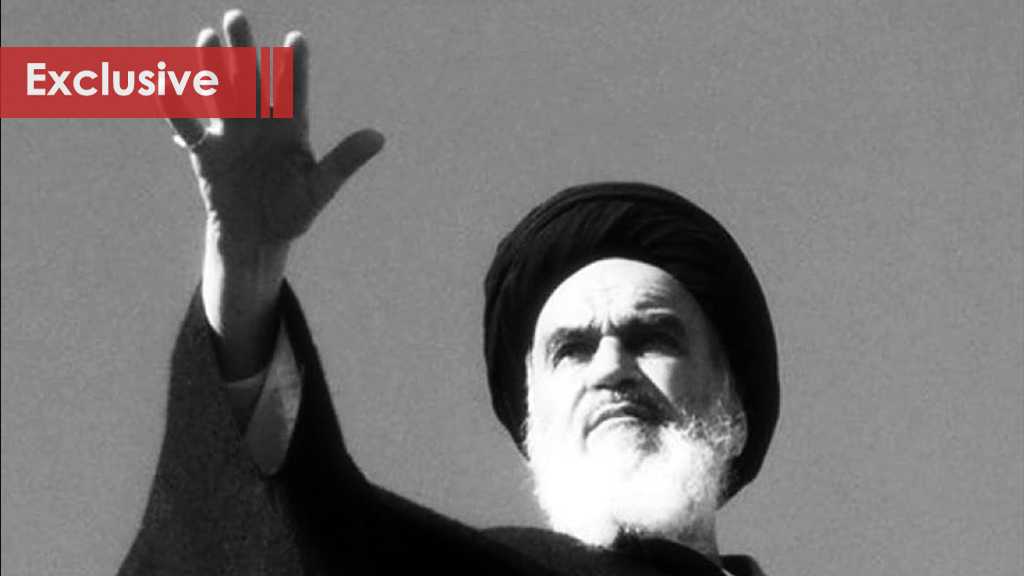
Imam Khomeini’s Model: High and Mighty against the High-and-Mighty

By Batoul Ghaddaf
Beirut - From Islam vs. West to Islam vs Imperialism in all of their forms, Imam Khomeini proposed a groundbreaking worldview.
Prior to the Islamic revolution of Iran, Islamist groups declared war on the West, making it seem as if it is the West vs Islam, yet when Imam Khomeini came, he abolished this concept. He introduced a new term, a new strategy to act as he declared “Not Eastern nor Western, but an Islamic Republic”, stating the conflict as to be Islam vs Imperialism. This strategy gave life to a new worldview that has become a continued legacy. When other Islamists were speaking to the imperialist west as their rival, Imam Khomeini was saying they are not even our rivals, our rivals make them our equals, and we refuse to be equated with the imperialists.
This approach posed by Imam Khomeini broke the spirit of American hegemony on the Iranian people from one side and on the Arabs, who thought Camp David was the end of their dreams of sovereignty on another. It restored faith and confidence in not the governments, but the people, the individuals as creators of their own independence and future. This was most evident when the youth decided to attack the American embassy in Iran in 1979, where Imam Khomeini responded saying, “America cannot do a damn thing to us.” This statement became the headline of many big newspapers around the world. It was a shock to the American authorities. No one expected a “nobody”-state which just had its revolution to revolt this aggressively against the United States of America.
The supremacy Imam Khomeini stood against was not just limited to the Western world, although it seems as so today. In 1989, he sent a letter to the USSR predicting the fall of communism and inviting them to read about the Islamic revolution. The minister of foreign affairs of the USSR paid the Imam a visit to deliver the response. This man saw himself as the representative of the Eastern most powerful country in the world. To meet Khomeini, he was taken into a humble room with an old rug, where he had to take his shoes off to enter. He then waited for more than 30 minutes for Khomeini. He read the letter with stutters and shivers in the presence of Imam Khomeini. This reaction was mostly out of shock as he did not expect that the Imam would have the upper hand in this meeting. It is never that a weak state has the upper hand against a strong state. When he was done, Imam Khomeini spoke for only a minute and simply left before the translator could finish translating to the minister, paying no attention to the minister beyond what he came there for.
Slowly, this Khomeinist worldview shaped an Islamic political philosophy implemented in Iranian foreign policy today. A political philosophy which holds enmity towards arrogance and oppression and friendship and compassion towards the oppressed. This is evident in the friendship the Islamic Republic held with China and the help it offered, and still offers, to Palestinian leaders. The former has great economic relations with Iran, considering Iran a permanent exports partner. These relations have been made since the birth of the Islamic republic in 1979. The latter has been offered help and received training and weaponry. PLO leader Yasser Arafat called Iran “his own home” when he visited Khomeini in Tehran. In addition to these, the Cuban late president Fidel Castro visited the house of Imam Khomeini and his grave in 2001. He considered the victory of the Islamic Revolution as a major change in the power dynamics in favor of the oppressed countries against the colonial ones.
The legacy continues with the current Islamic Revolution Leader Khamenei through declaring enmity towards arrogant behaviors of Pompeo, as he speaks to the Arabs, and of Trump, the epitome of white supremacy which has not stopped in American politics long after slavery has ended.
Therefore, according to the Islamic Republic’s foreign policy, these attitudes of supremacy and hegemony could not be tackled with a language of rivals and equals. Diplomacy has no place with oppressive states. The only attitude to be expected of Islamic Iran against such states is for Iran to be, as Khomeini planted, high and mighty against the high-and-mighty.



